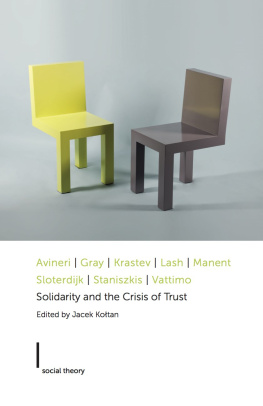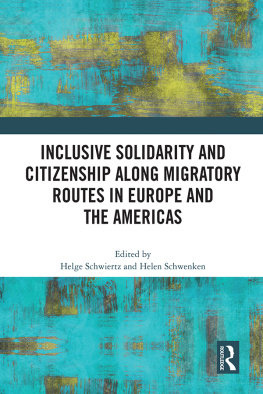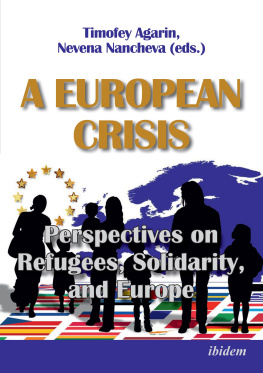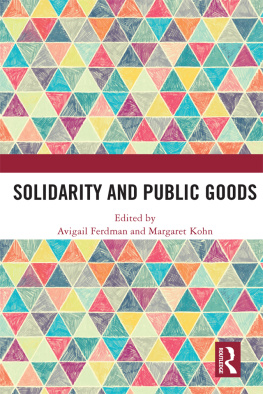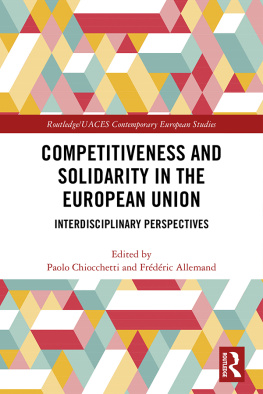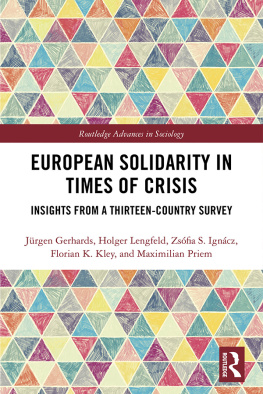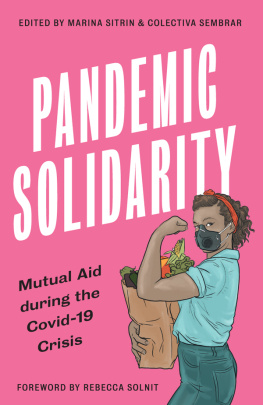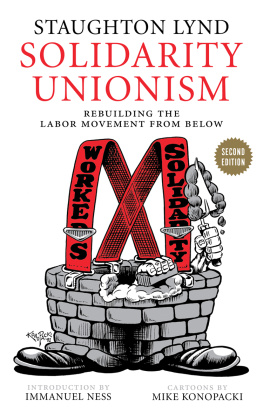Series idea of solidarity
Advisory Board:
Edwin Bendyk, Collegium Civitas, Warsaw
Barbara Fatyga, University of Warsaw
Basil Kerski, European Solidarity Centre, Gdask
Leszek Koczanowicz, SWPS, Wrocaw
Marcin Krl, University of Warsaw
Sawomir Magala, Erasmus University Rotterdam
Elbieta Matynia, New School for Social Research, New York
David Ost, Hobart and William Smith Colleges, Geneva, New York
Jadwiga Staniszkis, Polish Academy of Sciences, Warsaw
Tomasz Szkudlarek, University of Gdask
Series edited by Jacek Kotan, European Solidarity Centre, Gdask
Marcin Krl
INTRODUCTORY REMARKS
Solidarity has turned out to be a crucial concept for understanding political, moral, and human reality indeed, crucial for understanding todays world at large. Although I intend neither to summarize nor conclude the thoughts of the many marvelous thinkers present in this volume, I do wish to formulate several remarks which either directly or indirectly arise from those thoughts. Let me stress that it is worth noting the radical deficit of social solidarity (or brotherhood, as one of the authors prefers) that appeared in the modern era (that is, following the French Revolution). It is also worth noting not so much how the idea of solidarity takes shape, but how its practice does.
The first idea is paradoxical and relates to the collapse of social solidarity with the dynamic development of liberalism, which no doubt owes much to the French Revolution both in a positive and negative sense. The universalism of the revolutionary ideas along with the revolutionaries fundamental slogan namely, freedom facilitated the practical transformations of both legal provisions and mentality. Conversely, the horrors of the Reign of Terror inclined thinkers like Benjamin Constant to mount a thoroughgoing defense of private freedom against all political intervention. Thus began the long history of conflict between the communitarian idea of democracy and liberal individualism.
Secondly, inasmuch as Europeans in the nineteenth century were gradually becoming equal before the law, the fact of their material inequality was also becoming clearer all the more so as said inequality was frequently dramatic and left unmitigated. Over time social democracy led to a reduction of these inequalities and gradually civilized them, but there was never to be a return to the times when people felt satisfied with the forms and the level of life in the communities in which they were born and which had seemed natural to them.
Thirdly, these very communities underwent forced decline as a result of social transformations, above all urbanization, something which brought about the demise of village and smalltown communities of the type that some city planners are now endeavoring to reconstruct, inspired as they are by the philosophy of communitarians.
What was the result of this? What foremost appeared was the problem (just decades ago not yet present) of the limits of universalism, or its modern version namely, globalization. What is the relationship of solidarity to the universalism of the liberal idea? We know better and better that not only some practical difficulties, but also some serious doubts on the part of theoreticians of political thought are related to the issue. After all, does universalism, including the universal idea of human rights, foster the diversity of human communities, or rather does it undermine the diversity, which is of course essential for the existence of solidarity? The truth is that there still are unrepentant optimists who believe that one day all of humanity will be bound in solidarity however, sober reflection on reality rules out any such possibility in the foreseeable future. Moreover, universalism pretends to treat the individual as ever and always the same by nature, and hence belittles local customs, traditions, and ties. If, however, we insist that universalism (as an idea accompanying humanity at least since the birth of Christianity) is not acceptable, we thereby deprive ourselves of the philosophical tools which humanity has developed all over the centuries. This dilemma is just one among many which accompany the extinction of genuine social solidarity.
The second dilemma is the matter of trust. Although there is no need to idealize the past, neither is there the slightest doubt that trust is in short supply today both in relations between people and in relations between people as citizens and the political power, even in democracies. In fact, many modern philosophers (the most illustrious of whom was Thomas Hobbes) held basic doubts concerning whether or not trust is at all a feature we may discern in society. Thus, it is no coincidence that Hobbes political philosophy is a focus of intense interest for virtually all outstanding contemporary thinkers. Hobbes stated the matter in no uncertain terms: if not for rules (legal ones included) imposed by the sovereign, and to which people have expressed consent, there would be ceaseless war between them, as in the state of nature homo homini lupus est .
Nonetheless, both purely practical reasons and overriding political concerns have persuaded us to recognize trust as the basis for a reasonable life in democracy. We may bluntly state that without trust democracy does not and cannot exist. After all, the idea so fundamental to democracy of representation rests on trust, as do all the participatory behaviors proper to free-market democracy. Of course, the law exists, but democracy can never be reduced to the rule of law. Those who propose the legal regulation of as many political and social behaviors as possible are sometimes right, but usually they are not, as they supplant what we are accustomed to calling decency or responsibility with legal regulations. And in so doing they deprive us of our humanity.
Trust is also the basis of solidarity, both in the sense that without elementary solidarity democracy cannot function well, and in the sense that solidarity is a form of mutuality in human relations based not on interest, but on the feeling of community. Indeed, if we were to limit solidarity to a community of interests, the very idea of solidarity would be superfluous. Solidarity is a community of trust. In the radical sense, one that was assuredly never practical, solidarity guarantees for us that, even in the worst misfortunes, we will not be left alone. In the more moderate and practical sense, solidarity is merely the (otherwise lofty!) conviction that the community binds. That voluntary or innate belonging (here communitarians have carried out many distinctions) to a community rests primarily with the act of membership that is, with mutual obligation. This is not simply loyalty, as loyalty is always loyalty toward someone. Trust is something more namely, loyalty towards all members of the community.
The deficit of trust appeared together with the weakening of communities, and thus it is no doubt linked to the negative consequences of universalism. However, the shortage of trust (whether we ascribe it to overblown individualism or an excess of legal regulations, or to the marked demise of traditional communities in the modern era) is to a certain degree unavoidable. We must therefore ask the question that for now has no good answer: can democracy in its present form be expected to last without trust? Political philosophy inclines us to respond in the negative. However, reality sometimes leads us to solutions which philosophers never even dreamt of.
Here we encounter the third problem namely that related to the following questions. What kind of communities may we contend with today? Within the framework of what kind of communities can social solidarity be saved? In what frameworks has the idea of solidarity been buried once and for all?

